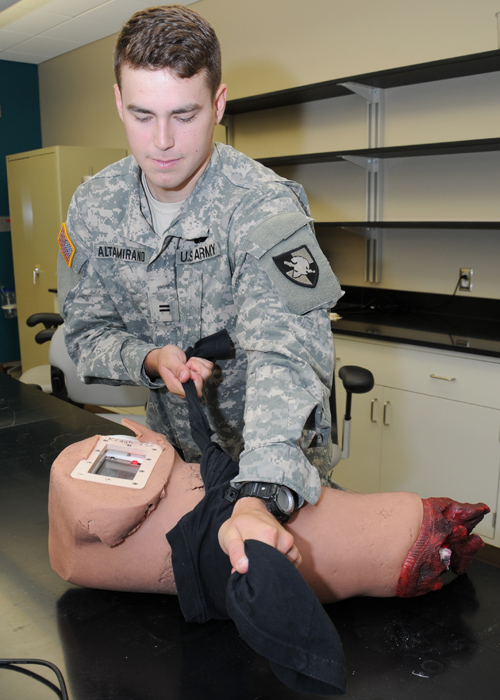West Point Cadet Learns Combat Casualty Care

This year the U.S. Army Institute of Surgical Research hosted Sergeant Matthew P. Altamirano, third-year West Point cadet, at Joint Base San Antonio-Fort Sam Houston, Texas, where he received hands-on experience in combat casualty care research'specifically working with tourniquets.
As upcoming future U.S. Army commissioned officers, West Point cadets are educated and rigorously trained through drills designed to shape them into top-notch leaders.
The long hours of drills, physical training and education help prepare the cadets for their careers after they graduate from the academy. They also gain knowledge and experience from time they spend with worldwide Army commands every summer.
Altamirano spent his time at USAISR under the mentorship of retired Col. John F. Kragh, an orthopedic surgeon and tourniquet researcher and a 1985 West Point graduate himself. Kragh said the experience and exposure cadets receive during the summer is invaluable in many ways.
"West Point is great at training cadets on Army stuff," he said. "They have to go out and experience firsthand what is available for them once they leave the academy so that they can determine what career path they want to follow."
Altamirano will graduate from West Point with a bachelor's degree in mechanical engineering. He agrees with Kragh and said the experience he has gained at USAISR has given him a better idea of what career path he would like to pursue.
"I've learned a lot about tourniquets and the research process," said Altamirano. "I had no idea how important combat casualty care research is and how it's all conducted for the combat-wounded. I am now considering the medical corps when I'm active duty."
The New Mexico native said he decided to attend West Point to serve his country and follow in his dad's footsteps.
"It's exciting to think that when I graduate I will be leading Soldiers," he said. "My family is very proud of me."
Altamirano left USAISR in late July to commence his junior year at West Point. He said he was grateful for the experience and training that he received while there. After spending about three weeks learning about tourniquets and how they work, he feels confident that he will know how to apply one if ever needed in the future.
"I had very little exposure to tourniquets before coming here," said Altamirano. "It's good to know how to apply them and how they work. It has been an awesome experience."
 An official website of the United States government
An official website of the United States government
 ) or https:// means you've safely connected to the .mil website. Share sensitive information only on official, secure websites.
) or https:// means you've safely connected to the .mil website. Share sensitive information only on official, secure websites.


